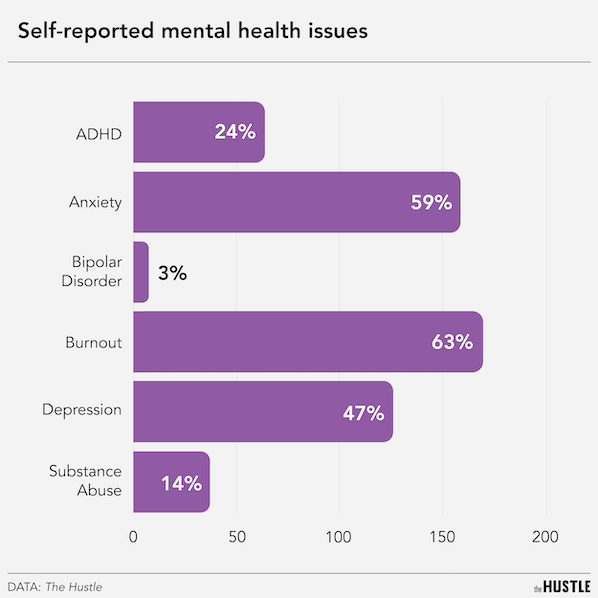Mental health issues among entrepreneurs are on the rise, yet people don’t talk about them enough. According to Forbes, it has reached epidemic levels.
I am one of 582 million entrepreneurs, and we make up almost 8% of the global population. I have devoted the past 30 years to entrepreneurial pursuits. This means that I have been either starting or operating one of my businesses over the past three decades. But what are the implications of this identity as an entrepreneur on my psychological wellbeing?
The life of an entrepreneur is taxing. Our challenges include raising capital, having inconsistent levels of income, establishing a brand, creating a web and social media presence, building a dependable team, growing the business without sacrificing quality, and many others.
While many outsiders view entrepreneurship as a dream career full of excitement, the reality is that entrepreneurship is a rocky road. Anxiety has a way of spinning out of control when considering all the unknowns. What if my business fails? What if I can’t meet payroll? What if I lose my friends? What if I’m not good enough?
The top sources of anxiety, according to a survey of entrepreneurs, include:
- Financial concerns (21%)
- Day-to-day stress (16%)
- Work-life balance (15%)
- Uncertainty about the future (12%)
If you struggle with mental health issues such as anxiety, depression, imposter syndrome, or even stress as an entrepreneur, know that you are not alone.
While entrepreneurs make up about 8% of the global population, as a cohort, they are exponentially more likely to suffer from mental health problems. Yet, people don’t talk about that enough. According to a study by UC Berkeley, 72% of entrepreneurs are directly or indirectly affected by mental health issues compared to just 48% of non-entrepreneurs.
To be more specific, University of San Francisco researcher Michael Freeman, says that entrepreneurs are:
- Twice as likely to suffer from depression (30%)
- Six times more likely to suffer from ADHD (19%)
- Three times more likely to suffer from substance abuse (12%)
- Ten times more likely to suffer from bipolar disorder (11%)
- Twice as likely to have a psychiatric hospitalization
- Twice as likely to have suicidal thoughts
According to their survey, The Hustle documented the following mental health issues self-reported by entrepreneurs.

While the numbers are high, the findings aren’t shocking, given how stressful starting a new business can be. Much of what makes a great entrepreneur makes them vulnerable to mental health issues, including suicide. Ignoring these needs for the sake of the business is a choice that entrepreneurs cannot afford to make.
In fact, suicide among entrepreneurs really hit home for me when Jerry Faulb, a friend and mentor with SCORE and the Small Business Development Center, who struggled with depression, took his own life.
Anne Cramer says another part of the issue is the idea of what a founder “should” look like. “Part of the problem is that our society glamorizes and fetishizes entrepreneurship, focusing on the billionaires, while the majority of startups fail,” she says. Expectations for entrepreneurs are extremely high. They are trying to live up to some of the most successful people on earth.
Entrepreneurs need to find a way to share when they are having a bad day and be honest about their feelings regarding stress, burnout, anxiety, depression, or any other emotion they are dealing with. The following are a few suggestions that entrepreneurs should consider embracing to become more aware of mental health issues and how to manage their feelings.
Take Note of Negative Feelings
Tania Diggory, Founder of Calmer, wrote in Psychologies Magazine that entrepreneurs need to get comfortable with being uncomfortable. “Every day presents different challenges as an entrepreneur … the entrepreneur lifestyle demands that you take calculated risks, try new things, find solutions and make bold moves … this can feel highly overwhelming and have a profound impact on a person’s mental health and wellbeing.”
One productive way to manage negative thoughts and feelings is to first accept them as normal. Take note of them so you can address what is causing them. Because running a business can be overwhelming and consume all your time and energy, certain recurring situations will cause a high amount of stress. It may be the workload, financial uncertainty, or the fear of the unknown. Identifying these feelings and what caused them is the first step in dealing with them.
Look for a Mental Health Support Network
As entrepreneurs, we all understand the value of having a business network, but what about developing a mental health support network? In addition to building a team to support business tasks, entrepreneurs should consider building a mental health support network. The members can be friends, family, suppliers, mentors, or customers. I personally find comfort in my network of mentors with whom I can occasionally share my feelings since most of them have also experienced them at one time or another.
Studies have shown that a lack of a social support network can be linked to depression and feelings of loneliness, which alter the functioning of our brains and lead to issues such as cardiovascular disease, depression, increased alcohol consumption, and increased suicide rates among entrepreneurs.
Social media groups can also provide entrepreneurs access to mental health support from people all over the globe. Finding groups of entrepreneurs and small business owners that share your struggles online can be a great way to get support and let you know that you are not alone. The “r/Entrepreneur” subreddit is one place to share your feelings and get feedback from other entrepreneurs. Asking for help is a sign of strength, not weakness.
Get Professional Support
Telehealth visits and mental health apps are a great way to fit professional help into your daily grind. Professional help is not limited to a psychologist or therapist. Everyone will likely need some form of professional help at some point in their lives, so do not be afraid to accept help.
Maintain a Healthy Work-Life Balance
It is important to carve out downtime from your working life to achieve a work-life balance. I have heard of some business owners adding their working hours to their email signatures to remind their clients of their downtime and manage their expectations.
Others have shared that they include meditation, yoga, or a daily walk during their workday. You don’t need to carve out two hours a day or make it complicated. Make it something you enjoy, giving your mind and body some peace. Since I work at home, I make it a point to take the dog out, if only to break up the day, relieve stress, and get my head right. With business pulling you in so many directions, knowing you have that sacred bit of time every day can be priceless.
Getting a good amount of rest and sleep can improve your productivity at work. You will also be more motivated while working, knowing you have free time to enjoy and work towards.
Disconnect Business Value from Your Self-Worth
There’s a tendency for entrepreneurs to define themselves by the success of their business, which is detrimental to mental health. During difficult periods, many entrepreneurs put their heads down and spend more time on their business. As a result, they tend to neglect their family, friends, and life outside of work. Make time to practice self-love, and realize that your balance sheet does not define who you are or what you’re worth.
Outsourcing
According to Gay Hendricks, it’s time to define your zone of genius to end negative thinking and live in true creativity. Your zone of genius is the role and accompanying activities that you’re great at and enjoy doing.
Look at your life and find the things taking up mental space and depleting your energy, and contract someone to handle it. As entrepreneurs, you are forced to wear many different hats. Many tasks, such as accounting that you may not be very good at, cause stress or feelings of guilt or inadequacy. Rather than get bogged down in activities that you are not good at and do not like, relinquish responsibility and control to someone else.
Outsourcing could be hiring someone to do your laundry or clean your house or organize a work function. Working in your zone of genius will allow you to find more joy in your work and improve results.
Many small businesses operate on a very tight budget, so you may want to consider outsourcing some functions to freelancers. I recommend that my clients consider using a freelancing platform such as Upwork, Freelancer, and TopTal. I employ an Editor who was a former digital nomad now living in Costa Rica, a Virtual Assistant and IT support person from the Philippines, and a Website Programmer and Social Media Ad Manager in India at rates unheard of in the US. Each freelancer is an expert in their respective field, so they work fast, and most cost me less than $10 per hour.
I would never attempt to do my own company’s income taxes and therefore have a CPA. The same model can be used for zones of genius that are outside your own.
Seek Self-Acceptance
Seeing our struggles for what they are and accepting them makes it possible to move forward without shame and self-judgment. If we experience mental health struggles, then more than likely, we are doing the same to others. Most of us became entrepreneurs because we knew we could make a difference and bring about meaningful change, but we cannot do it if we are constantly judging ourselves and others.
Entrepreneurs are often portrayed as superheroes of the business world. However, working for yourself can often feel like the complete opposite. The expectation of having everything under control can make it even harder to recognize your weaknesses or ask for help.
According to Calmer, many of us regularly seek out happiness highs, often resulting in disappointment. Instead, they recommend focusing on achieving a level of contentment rather than pursuing happiness. Contentment is a mental or emotional state of satisfaction, often resulting from being at ease with one’s mind, body, and surroundings.
As an entrepreneur, what are you doing to manage your mental health?












